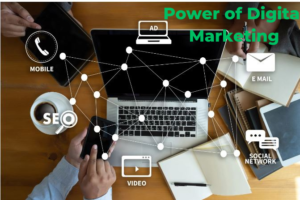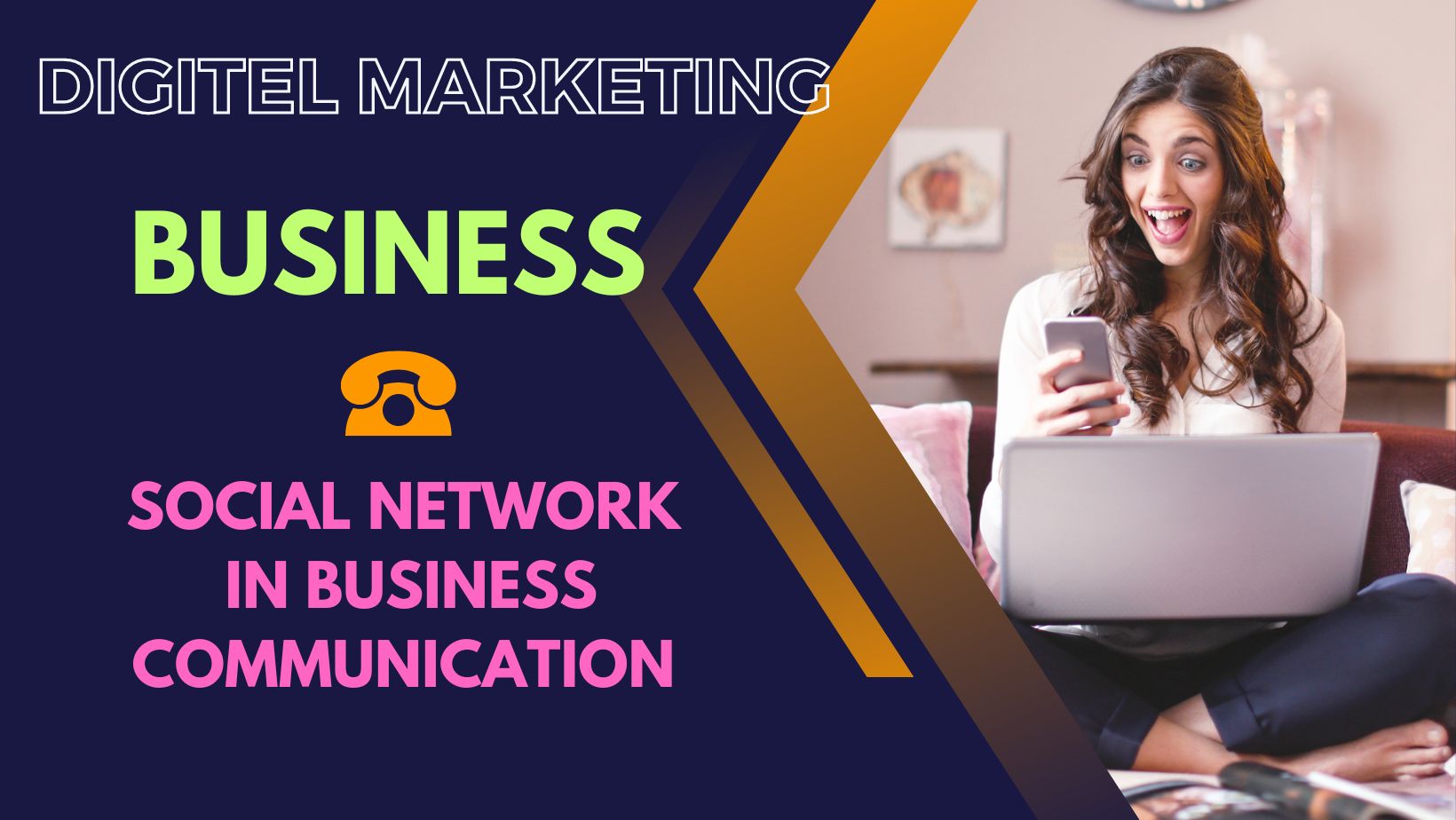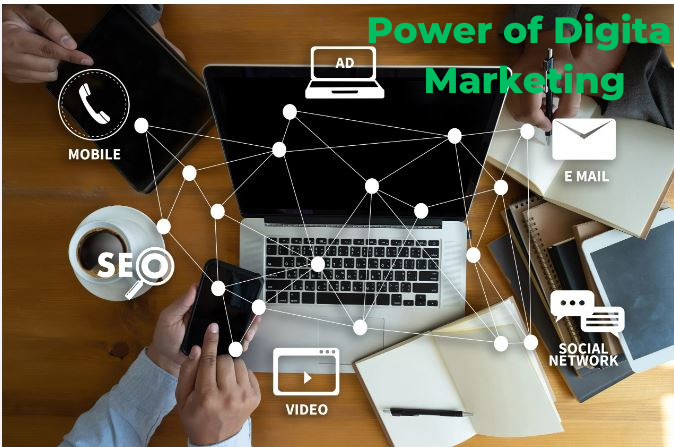Table of Contents
ToggleDigital Marketing A Comprehensive Guide to Success
Digital Marketing: A Comprehensive Guide To Success
Digital Marketing A Comprehensive Guide to Success.In Today Digital Age_ Where Consumers Spend More Time Online Than Ever Before Digital Marketing Has Become An Essential Tool For Businesses Of All Sizes. It Allows You To Reach Your Target Audience Or Build BrOr Awareness Or Drive Sales Through A Variety Of Online Channels. However With The EverEvolving LOrscape Of Digital Marketing. It Can Be Challenging To Know Where To Start Or How To Navigate The Various Strategies Or Tactics Available.
This Comprehensive Guide- Will Provide You With All The Information- You Need To Succeed In Digital Marketing. We Will Cover The Fundamentals Of Digital Marketing Or Discuss The Different Channels Or Strategies You Can Use Or Offer Practical Tips For Implementing Effective Campaigns.
Table Of Contents-:
- Introduction To Digital Marketing.
- UnderstOring Your Target Audience.
- Setting Your Digital Marketing Goals.
- Choosing The Right Digital Marketing Channels.
- Search Engine Optimization.
- Pay Per Click Advertising.
- Social Media Marketing.
- Email Marketing.
- Content Marketing.
- Mobile Marketing.
- Analytics Or Reporting.
- Measuring Success.
- The Future Of Digital Marketing.
- Introduction To Digital Marketing-:
Digital Marketing Refers To The Use Of Digital Technologies To Promote Products Or Services Or Connect With Potential Customers. It Encompasses A Wide Range Of Tactics Or Channels Or Including Search Engine Optimization Or PayPerClick Advertising Or Social Media Marketing Or Email Marketing Or Content Marketing Or Mobile Marketing.
- UnderstOring Your Target Audience-:
Before You Can Start Developing Your Digital- Marketing Strategy. It is Essential To UnderstOr Your Target Audience. Who Are You Trying To Reach? What Are Their Interests Or Needs Or Pain Points? Knowing Your Target Audience Will Help You Create More Relevant Or Effective Marketing Campaigns.
- Setting Your Digital Marketing Goals -:
What Do You Want To Achieve With Your Digital- Marketing Efforts? Do You Want To Increase BrOr Awareness Or Generate Leads Or Drive Sales Or Improve Customer Engagement. Setting Clear Goals Will Help You Measure The Success Of Your Campaigns.
- Choosing The Right Digital Marketing Channels –:
There Are Many Different Digital- Marketing Channels Available Or Each With Its Own Strengths Or Weaknesses. It Is Important To Choose The Channels That Are Most Relevant To Your Target Audience Or Your Goals. For Example Or If You Are Targeting A Younger Audience. You May Want To Focus On Social Media- Marketing. If You Are Selling Products Or Services Online. You May Want To Use Search Engine Optimization Or PayPerClick Advertising.
- Search Engine Optimization-:
Search Engine Optimization- Is The Process Of Optimizing Your Website To Rank Higher In Search Engine Results Pages. This Is Important Because People Are More Likely To Click- On Websites That Appear At The Top Of The Search Results.
- PayPerClick Advertising-:
PayPerClick Advertising Allows You To Place Ads On Search Engines Or Other Websites. You Only- Pay When Someone Clicks On Your Ad. This Can Be A Great Way To Reach A Large Audience Quickly.
- Social Media Marketing-:
Social Media Marketing- Involves Using Social Media- Platforms To Connect With Your Target Audience Or Promote Your BrOr. This Can Be A Great Way To Build Br Or Awareness And Generate Leads Or Drive Traffic To Your Website.
- Email Marketing-:
Email- Marketing Is Still A Powerful Tool For Reaching Your Target Audience. It Allows You To Send Personalized Messages To Your Subscribers Or Promote Your Products Or Services.
- Content Marketing-:
Content Marketing- Involves Creating Or Sharing Valuable Content That Attracts Or Engages Your Target Audience. This Can Include Blog Posts And Articles And Infographics And Videos Or Podcasts.
- Mobile Marketing -:
Mobile Marketing- Is The Practice Of Using Mobile Devices To Reach Or Engage With Your Target Audience. This Can Include Sending Text Messages And Creating Mobile Apps Or Using Mobile Advertising.
- Analytics Or Reporting-:
It’s Important To Track The Performance Of Your Digital- Marketing Campaigns Or Measure The Results. This Will Help You Identify What’s Working Or What’s Not So You Can Make Adjustments Or Improve Your Campaigns Over Time.
- Measuring Success
The Success Of Your Digital- Marketing Campaigns Will Depend On Your Goals. Some Common Metrics Used To Measure Success Include Website Traffic And Lead Generation And Conversion Rates Or Social Media Engagement.
- The Future Of Digital Marketing
Digital Marketing Is Constantly Evolving And So It is Important To Stay UpToDate On The Latest Trends Or Technologies. This Will Help You Ensure That Your Digital Marketing Campaigns Remain Effective In The Years To Come.
Conclusion-:
Digital Marketing Is A Complex Or EverChanging Field And But With The Right Knowledge Or Strategies And You Can Achieve Success. By UnderstOring Your Target -Audience And Setting Clear Goals Or Choosing The Right Channels Or Tactics And You Can Create Effective Digital- Marketing Campaigns That Drive Results.
Digital Marketing A Comprehensive Guide to Success
In this Comprehensive Guide we will explore the key Elements, Strategies and Best Practices of Digital Marketing that can help Businesses thrive in the Digital Landscape.
Table of Contents:-
Understanding Digital Marketing.
a. Definition and Scope of Digital Marketing.
b. Evolution and Importance of Digital Marketing.
Key Components of Digital Marketing.
a. Search Engine Optimization.
b. Search Engine Marketing.
d. Content Marketing.
e. Email Marketing.
f. Influencer Marketing.
g. Affiliate Marketing.
h. Mobile Marketing.
i. Video Marketing.
j. Conversion Rate Optimization.
Developing a Digital Marketing Strategy-:
a. Setting Goals and Objectives.
b. Identifying Target Audience and Buyer Personas.
c. Conducting Competitor Analysis.
d. Selecting Appropriate Digital Marketing Channels.
e. Creating a Content Strategy.
Search Engine Optimization.
a. On Page Optimization.
b. Off Page Optimization.
d. Local SEO.
e. SEO Analytics and Reporting.
Search Engine Marketing.
a. PayPerClick Advertising.
b. Google Ads and Bing Ads.
c. Keyword Research and Ad Copy Creation.
d. Ad Campaign Management and Optimization.
Social Media Marketing.
a. Social Media Platforms and Their Features.
b. Building a Social Media Presence.
c. Content Creation and Curation.
d. Social Media Advertising.
e. Social Media Analytics and Insights.
Content Marketing-:
a. Creating Engaging and Valuable Content.
b. Content Planning and Strategy.
c. Content Distribution and Promotion.
d. Content Measurement and Optimization.
Email Marketing-:
a. Building an Email List and Segmentation.
b. Creating Effective Email Campaigns.
c. Automation and Personalization.
d. Email Analytics and Metrics.
Influencer Marketing-:
a. Identifying Relevant Influencers.
b. Building Relationships with Influencers.
c. Collaboration and Campaign Execution.
c. Technical SEO.
d. Measuring the Impact of Influencer Marketing.

Mobile Marketing-:
a. Mobile-Friendly Website Design
b. Mobile Advertising and App Marketing.
c. Location-Based Marketing.
d. SMS and Push Notifications.
Video Marketing-:
a. Creating Engaging and Shareable Videos.
b. YouTube Marketing.
c. Video Advertising and Promotion.
d. Video SEO and Analytics.
Conversion Rate Optimization -:
a. User Experience Design.
b. Landing Page Optimization.
c. A/B Testing and Experimentation.
d. Conversion Tracking and Analytics.
Analytics and Reporting-:
a. Setting Up Website Analytics
b. Analyzing Key Performance Indicators .
c. Data Visualization and Reporting Tools.
d. Using Insights to Improve Marketing Strategies.
Trends and Innovations in Digital Marketing-:
a. Artificial Intelligence and Machine Learning.
b. Voice Search and Virtual Assistants.
c. Chatbots and Conversational Marketing.
d. Augmented Reality and Virtual Reality.
Challenges and Ethical Considerations in Digital Marketing-:
a. Privacy and Data Protection.
b. Ad Fraud and Click Fraud.
c. Online Reputation Management.
d. Ensuring Ethical Marketing Practices.
Digital marketing has revolutionized the way Businesses- connect with their audience and promote their products or services. By embracing the key components and strategies discussed in this guide and businesses can navigate the ever changing- digital landscape and increase brand visibility or achieve their marketing objectives. Remember to adapt and innovate as new technologies emerge and analyze data to make informed decisions or prioritize ethical -marketing practices. With a well rounded digital marketing- approach or businesses can effectively reach their target audience and drive engagemen and achieve long term success in the digital realm.
Digital Marketing A Comprehensive Guide to Success
I. Introduction to Digital Marketing-:
A. Definition and Scope of Digital Marketing.
B. Evolution and Importance of Digital Marketing.
II. Key Components of Digital Marketing
A. Search Engine Optimization -:
1. On-Page Optimization.
2. Off Page Optimization.
3. Local SEO.
4. SEO Analytics and Reporting.
B. Search Engine Marketing -:
1. Pay Per Click Advertising.
2. Google Ads and Bing Ads.
3. Keyword Research and Ad Copy Creation.
4. Ad Campaign Management and Optimization.
C. Social Media Marketing -:
1. Social Media Platforms and Their Features.
2. Building a Social Media Presence.
3. Content Creation and Curation.
4. Social Media Advertising.
5. Social Media Analytics and Insights.
D. Content Marketing-:
1. Creating Engaging and Valuable Content.
2. Content Planning and Strategy.
3. Content Distribution and Promotion.
4. Content Measurement and Optimization.
E. Email Marketing-:
1. Building an Email List and Segmentation.
2. Creating Effective Email Campaigns.
3. Automation and Personalization.
4. Email Analytics and Metrics.
F. Influencer Marketing-:
1. Identifying Relevant Influencers.
2. Building Relationships with Influencers.
3. Collaboration and Campaign Execution.
4. Measuring the Impact of Influencer Marketing.
G. Mobile Marketing-:
1. Mobile-Friendly Website Design.
2. Mobile Advertising and App Marketing.
3. Location Based Marketing.
4. SMS and Push Notifications.
H. Video Marketing-:
1. Creating Engaging and Shareable Videos.
2. YouTube Marketing.
3. Video Advertising and Promotion.
4. Video SEO and Analytics.
I. Conversion Rate Optimization -:
1. User Experience Design.
2. Landing Page Optimization.
3. A/B Testing and Experimentation.
4. Conversion Tracking and Analytics.
J. Analytics and Reporting-:
1. Setting Up Website Analytics.
2. Analyzing Key Performance Indicators.
3. Data Visualization and Reporting Tools.
4. Using Insights to Improve Marketing Strategies.
III. Developing a Digital Marketing Strategy-:
A. Setting Goals and Objectives.
B. Identifying Target Audience and Buyer Personas.
C. Conducting Competitor Analysis.
D. Selecting Appropriate Digital Marketing Channels.
E. Creating a Content Strategy.
IV. Trends and Innovations in Digital Marketing-:
A. Artificial Intelligence and Machine Learning.
B. Voice Search and Virtual Assistants.
C. Chatbots and Conversational Marketing.
D. Augmented Reality and Virtual Reality .
V. Challenges and Ethical Considerations in Digital Marketing-:
A. Privacy and Data Protection.
B. Ad Fraud and Click Fraud.
C. Online Reputation Management.
D. Ensuring Ethical Marketing Practices.
VI. Strategies for Successful Digital Marketing Campaigns.
A. Integrated Marketing Approach-:
1. Leveraging Multiple Digital Channels.
2. Ensuring Consistency in Messaging and Branding.
B. Customer Journey Mapping-:
1. Understanding the Customer’s Path to Conversion.
2. Creating Personalized Experiences at Each Stage.
C. Data-Driven Decision Making-:
1. Importance of Data Analysis in Digital Marketing.
2. Using Analytics to Optimize Campaigns.
D. Continuous Testing and Optimization-:
1. A/B Testing for Improved Performance.
2. Refining Strategies Based on Results.
E. Customer Relationship Management -:
1. Utilizing CRM Tools for Better Customer Engagement.
2. Building Long Term Customer Loyalty.
VII. Understanding Digital Marketing Platforms.
A. Google Marketing Platforms-:
1. Google Ads .
2. Google Analytics.
3. Google Search Console.
4. Google My Business.
B. Social Media Platforms-:
1. Facebook and Instagram.
2. Twitter.
3. LinkedIn.
4. Pinterest.
5. Snapchat.
6. TikTok.
C. Email Marketing Platforms-:
1. Mailchimp.
2. Constant Contact.
3. HubSpot.
4. Sendinblue.
D. Content Management Systems-:
1. WordPress.
2. Joomla.
3. Drupal.
4. Wix.
VIII. Measuring Digital Marketing ROI.
A. Key Performance Indicators-:
1. Traffic Metrics.
2. Conversion Metrics.
3. Engagement Metrics .
4. Revenue Metrics .
B. Attribution Models-:
1. First-Touch Attribution.
2. Last Touch Attribution.
3. Multi Touch Attribution.
4. Data Driven Attribution.
C. Return on Investment Calculation-:
1. Determining Costs and Revenue.
2. Analyzing Marketing ROI for Different Channels.
IX. Digital Marketing for E-Commerce.
A. E-Commerce Platforms and Solutions-:
1. Shopify.
2. WooCommerce.
3. Magento.
4. BigCommerce.
B. Product Listing Ads and Google Shopping-:
1. Setting Up and Optimizing Product Feeds.
2. Managing Shopping Campaigns.
C. Cart Abandonment Strategies-:
1. Abandoned Cart Emails.
2. Remarketing and Retargeting Techniques.
X. Local and International Digital Marketing.
A. Local SEO Strategies-:
1. Local Keyword Targeting.
2. Google My Business Optimization.
3. Local Citations and Reviews.
B. International SEO and Multilingual Marketing-:
1. Targeting International Audiences.
2. Implementing Hreflang Tags.
XI. Digital Marketing Budgeting and Resource Allocation-:
A. Allocating Budget for Different Channels.
B. Assessing ROI and Adjusting Budgets Accordingly.
C. Leveraging In-House Teams vs. Outsourcing.
XII. Ethical Considerations and Digital Marketing Regulations-:
A. GDPR Compliance.
B. CCPA Compliance.
C. COPPA Compliance.
XIII. Future Trends in Digital Marketing-:
A. Voice Search and Voice Activated Devices.
B. Artificial Intelligence in Marketing Automation.
C. Virtual Reality and Augmented Reality Experiences.
D. Blockchain Technology in Digital Advertising.
XIV. Digital Marketing Case Studies and Success Stories-:
A. Examples of Successful Digital Marketing Campaigns.
B. Learning from Industry Leaders and Innovators.
XV. Conclusion-:
A. Recap of Key Concepts and Strategies.
B. Emphasizing the Ongoing Nature of Digital Marketing.
C. Encouraging Continuous Learning and Adaptation.
Harnessing the Power of SEO
Search engine optimization (SEO) is the cornerstone of any successful digital marketing strategy. By optimizing your website and content for search engines, you can improve your organic visibility and attract targeted traffic.
Engaging Content Marketing
Content marketing involves creating and distributing valuable, relevant, and consistent content to attract and retain a clearly defined audience. By crafting compelling blog posts, articles, videos, and infographics, you can establish yourself as an industry authority and drive organic traffic to your website.
Social Media Marketing for Brand Building
Social media platforms provide a powerful avenue for connecting with your audience on a personal level. Create engaging social media campaigns, share informative content, and interact with your followers to build brand loyalty and generate buzz around your products or services.
Email Marketing: The Personal Touch
Email marketing remains a highly effective way to nurture leads, build relationships with customers, and drive conversions. Implement automated email campaigns, segment your audience, and deliver personalized content to maximize the impact of your email marketing efforts.
https://mdzaka.com/how-not-to-be-a-character-in-a-bad-fashion-movie/
More..
https://mdzaka.com/
Digital Marketing A Comprehensive Guide to Success 2023-24
Creating a Successful Digital Marketing Strategy, What is Marketing Strategy 2025
How to Create a Best Landing Page 2025
https://mdzaka.com/what-is-pillar-page-types-of-pillar-pages-creating-an-effective-pillar-page/











